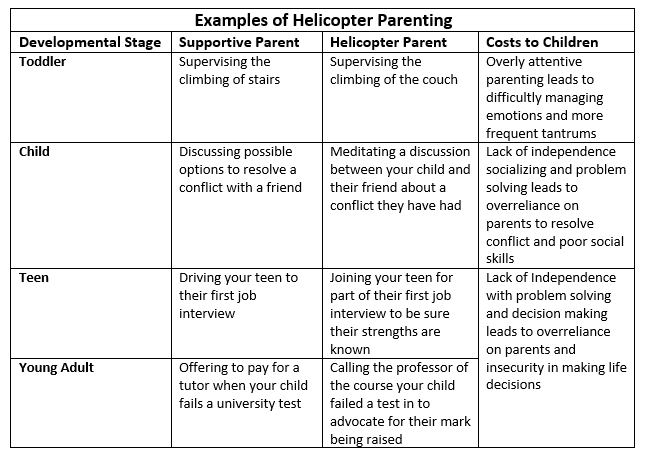This pop culture term refers to the ‘hovering’ or over-involved parent (Gabriel, 2010). Helicopter parents are anxious about their child’s well-being and/or success, and attempt to protect their child from hardship and disappointment. Helicopter parents provide their children with more guidance and direction than other parents, and are more involved with their day-today activities. Essentially, helicopter parents ‘micromanage’ their children’s lives.

Too much of a good thing?
Helicopter parents are concerned about their child’s physical and emotional well-being and provide high levels of warmth and support. However, although the helicopter parent may be relieved when they protect their child from hardship or disappointment, their child pays a price. Specifically the strategies used by helicopter parents prevent children from developing the experience and skills necessary to act on their own. As a result, they are more likely to be shy, socially inhibited, anxious, and have peer difficulties. The children of helicopter parents can also be more prone to anger and take more risks.
Tips to avoid helicopter parenting:
Evaluate whether the situation warrants such high levels of direction and affection from a parent. If not, foster your child’s autonomy as described below;
1. Free-Play: Permit free-play opportunities for your child and their peer without your involvement.
2. Social Skills: Teach social skills (e.g., turn-taking, handling conflict) that your child can perform semi-independently rather than you performing the skills for them.
3. Assertiveness: Foster your child’s ability to be assertive (e.g., teach them to make requests of peers and adults).
4. Dealing with Consequence: Teach your child that once they make a choice they have to live with the consequences (e.g., after leaving their bike outside overnight and it gets stolen, they have to save up for a new bike).
5. Self-Reliance: Given that emerging adulthood is a time to become self-reliant, adolescents should begin to solve their own problems and make their own decisions.
If you are a helicopter parent, you may benefit from discussing your anxieties about your child’s well-being and success with a child and family therapist. Family therapy can also help if your child becomes angry and resentful towards you.
Written by Dr. Kim Saliba
Clinical & School Psychologist



